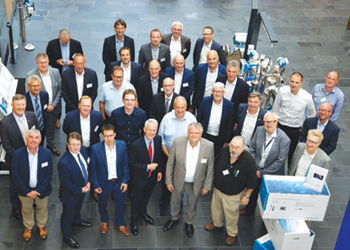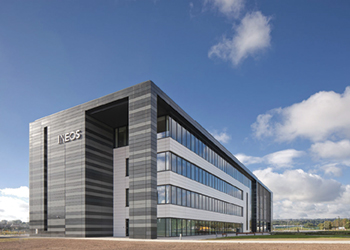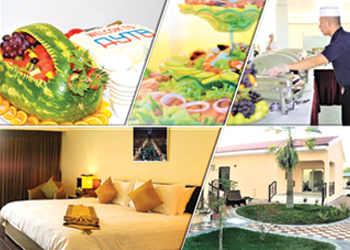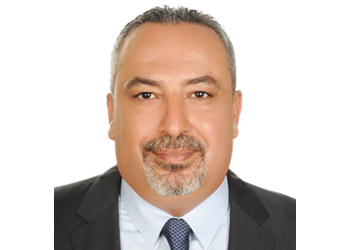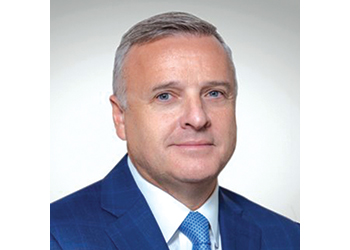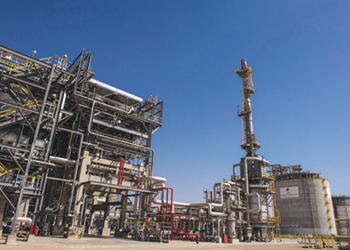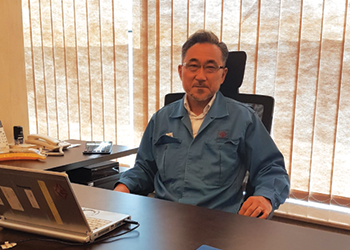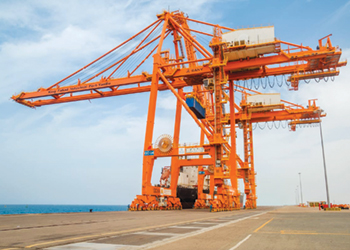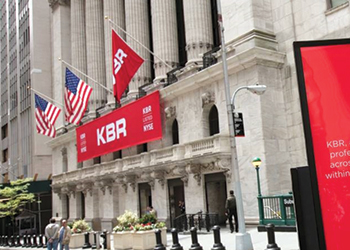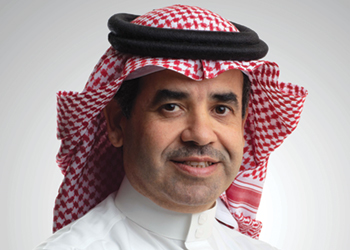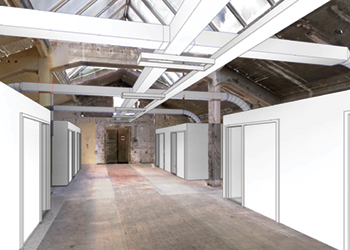
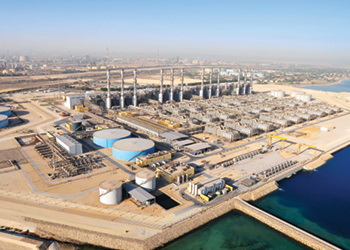 Jubail ... developing at a brisk pace
Jubail ... developing at a brisk pace
RCJY is to implement 50 initiatives targeting the goals of Saudi Vision 2030 that aims to provide further investments, nationalising services and diversifying economic resources
Saudi Arabia’s Royal Commission for Jubail and Yanbu (RCJY) has launched ten initiatives at a combined value of SR16.58 billion ($4.42 billion) as part of the newly-launched programme to develop the national industry and services.
These initiatives are set to cover all industrial cities which are managed by the Royal Commission for Jubail and Yanbu, according to an official statement.
RCJY had earlier announced plans to implement 50 initiatives to contribute to achieving the goals of Saudi Vision 2030 that aims to provide further investments, nationalising services and diversifying economic resources.
The Saudi energy minister Khalid Al-Falih states that his nation will ink SR235 billion in deals as part of the newly-launched programme to develop the national industry and services.
At the same time, the establishment of an integrated industrial complex in Yanbu industrial city in partnership with Saudi Aramco and Saudi Basic Industries Corp (Sabic) will contribute to creating opportunities for setting up small and medium enterprises (SMEs) and factories, states the Governor of Medina Prince Faisal bin Salman bin Abdul Aziz in a report.
The Prince indicated that the complex will play a role in national economic diversification and promote sustainable development.
 |
Prince Faisal ... raising the level of competencies |
Prince Faisal made the remarks during a visit to Yanbu province, where he congratulated the people on the project, which he described as one of the mega projects in the world, explaining that it will be developed with Saudi manpower and unprecedented international technology.
Saudi Aramco and Sabic recently announced that Yanbu will be the site for an integrated industrial complex they plan to build to convert crude oil to chemicals (COTC).
The governor pointed out that the Centre for Economic Development in the region will coordinate with the Royal Commission in Yanbu, Aramco, and Sabic to develop training programmes in order to raise the level of competencies and professionalism. He thanked Aramco and Sabic for this project which is a remarkable leap in the petrochemical world.
CEO of RCJY and Jazan, Alaa Nasif, lauded the project of converting crude oil to chemicals, executed by Aramco and Sabic, which is a revolution in the petrochemical industry globally.
Naseef said the project will be built according to the highest engineering standards. It is expected to process 400,000 barrels per day of crude oil, which will produce around 9 million tonnes of chemicals and base oils annually. It is expected to start operations in 2025.
Nassif noted that the project offers new opportunities to build leading industries in the kingdom through enhancing the value of crude oil production in Saudi Arabia, ensuring comprehensive integration to hydrocarbon industries, contributing to economic diversification by producing ready-made or semi-ready materials, and developing advanced technologies.
The new Yanbu complex will generate an estimated 30,000 direct and indirect jobs, as well as contribute 1.5 per cent to the kingdom’s gross domestic product.
The project is in line with Saudi Arabia’s economic diversification plans and job creation initiatives. The kingdom intends to support its downstream sector by increasing production and value across the entire hydrocarbons chain.
At the time of signing, Saudi Aramco’s president and CEO Amin Nasser said: "This project converges the commercial and strategic interests of both Saudi Aramco and Sabic, while reinforcing Saudi Aramco’s efforts to optimise the investment of our petroleum resources.
 |
Spark ... world-class energy industry hub |
"This project converges the commercial and strategic interests of both Saudi Aramco and Sabic."
"COTC will also help expand our downstream portfolio, reducing our focus on the transportation sector and securing new and promising commercial opportunities."
In October, Saudi Aramco and French firm Total agreed to begin engineering studies for the construction of a $5 billion petrochemical complex in Jubail, Saudi Arabia.
In April this year, the two companies signed a memorandum of understanding (MoU) to build the complex, which will be located next to the Satorp refinery.
The Saudi Arabian company will own a 62.5 per cent stake in the facility while Total will hold the remaining 37.5 per cent.
Said to be the first petrochemical plant in the Gulf region to be integrated with a refinery, the new facility will be able to produce 1.5 million tonnes of ethylene and related high-added-value petrochemical units per annum.
Nasser said: "Satorp’s second-phase expansion represents a quantum leap in Saudi Aramco’s downstream strategy to maximise our hydrocarbon resources and help position the kingdom as a chemicals manufacturing hub, thus supporting economic diversification.
"The signing will deliver on multiple levels, from high-value fuels and petrochemical products for consumers on three continents to meaningful job creation and local content development."
The petrochemical complex will provide feedstock to other petrochemical and speciality chemical plants. It is expected to begin production in 2024.
In addition, other petrochemical and speciality chemical plants located in the Jubail industrial area will benefit from the feedstock provided by the project. This will represent an additional $4 billion investment by third-party investors.
The overall complex will represent an investment of around $9 billion and is expected to create 8,000 local direct and indirect jobs.
Total chairman and CEO Patrick Pouyanné said: "This world-class complex also fits with our strategy to expand in petrochemicals by maximising the synergies within our major platforms, leveraging low-cost feedstocks and taking advantage of the fast-growing Asian polymer market."
The Saudi Aramco Total Refining and Petrochemical Company (Satorp) was set up in June 2008 to build a refining and petrochemical complex in Jubail II industrial city.
RCJY has signed 11 contracts at a combined value of SR1.361 billion ($370 million) to implement projects that will contribute to developing infrastructure and piling works. The projects will be distributed in Jubail, Yanbu, Ras Al Khair, and Jazan Economic City, according to an official statement. The deals include setting up projects in the electricity, industry, education, engineering, and healthcare sectors. These investments are part of Saudi Vision 2030, intended to diversify the kingdom’s economy and invest more heavily in infrastructure.
Meanwhile, in line with its ambition to diversify its energy mix, stimulate economic development and ensure sustainablity, Saudi Arabia launched its National Renewable Energy Program (NREP) which is aimed at maximising the potential of renewable energy in the kingdom.
In March this year, the kingdom revealed details of Phase Two of the NREP that will see seven solar photovoltaic (PV) projects being developed in the kingdom which will generate 1.52 GW energy and attract investments worth over $1.51 billion. The key projects include Qurrayat (200 MW), Madinah (50 MW), Rafha (45 MW), Al Faisaliah (600 MW), Rabigh (300 MW), Jeddah (300 MW) and Mahad Duhab (20 MW).
Meanwhile, in November last year the Crown Prince laid the foundation stone for the kingdom’s first nuclear research reactor, construction of which is under way. The kingdom plans to build two full nuclear power reactors for energy and as many as 16 over the next 25 years.
Among other renewable energy projects, a consortium headed by the Abu Dhabi-based Masdar is building the $500-million Dumat Al Jandal project, the first utility-scale wind farm in Saudi Arabia. When completed, the Dumat Al Jandal wind farm will generate sustainable power for up to 70,000 Saudi households.
One of the largest industrial hubs taking shape in the kingdom is Waad Al Shamaal, which is coming up over a sprawling 440-sq-km area in the northern region. King Salman inaugurated Phase One of the SR85-billion mega city for mining industries and laid the foundation stone for its second phase in November last year.
Spark, the world-class energy industry hub in the Eastern Province, was officially launched last year. Being developed on an area of more than 50 sq km located between Dammam and Al Hasa, it will be built in three phases, with the first phase expected to complete in 2021 and the entire development targeted for completion by 2035.
Spark, which is estimated to contribute some SR22.5 billion to the kingdom’s GDP by 2035, has been designed to position Saudi Arabia as a global energy, industrial and technology hub.
In the industrial sector, meanwhile, Sadara Chemical Company continues its expansion drive with the launch of work an ethylene oxide (EO) and propylene oxide (PO) pipeline project that will serve a key industrial cluster at PlasChem Park in Jubail.
Among other major industrial ventures set to take shape is a giant petrochemical complex in Jubail, which will be jointly developed by Saudi Aramco and French oil and gas major Total. The world-class complex will be located next to the Satorp state-of-the-art refinery, as part of its second phase expansion.
Saudi Arabian Mining Company (Ma’aden) is going ahead with its third large-scale phosphate complex (Phosphate 3) in the kingdom, and late last year awarded South Korea’s Daelim Industrial Company a SR3.4-billion contract to build the first plant in the complex.
Saudi Aramco and Saudi Basic Industries Company (Sabic) are developing a fully-integrated crude oil-to-chemicals (COTC) complex in the kingdom. KBR was awarded the project management and front-end engineering and design (Feed) contract last year.
Meanwhile, Saudi Arabia’s Water & Electricity Company (WEC) said a total of 71 developer consortiums have expressed interest in the independent water project (IWP) to be set up in the Yanbu province using reverse osmosis (RO) seawater desalination technology.
Of these around 30 are Saudi developers, who are keen to clinch the key project, which will boast a potable water capacity of up to 450,000 cu m per day, said senior WEC officials.








































































